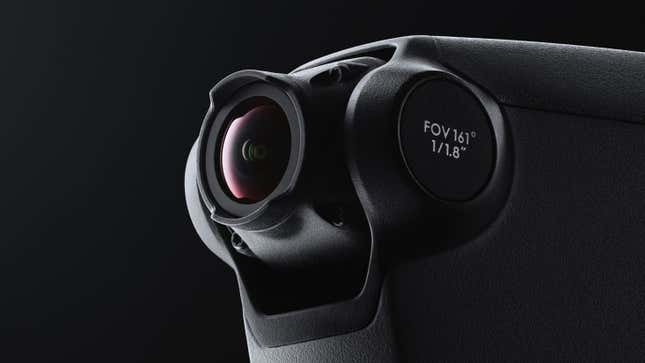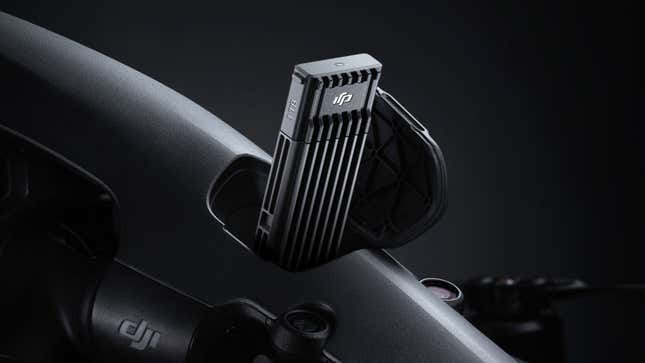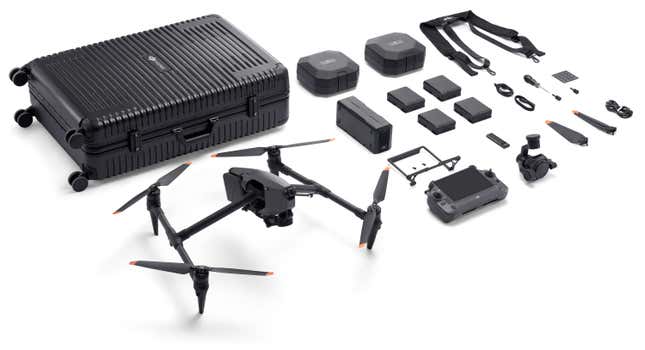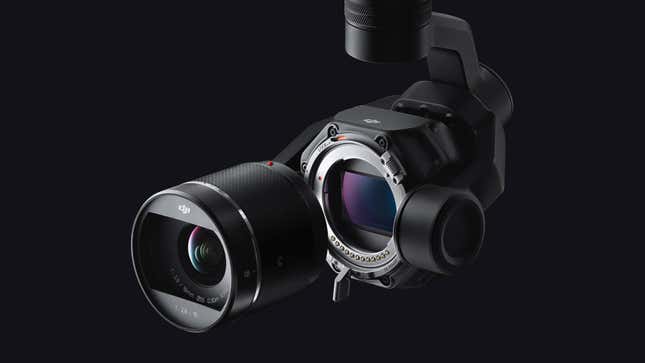DJI’s 8K Inspire 3 Cinematic Drone Costs $16,499
The original model debuted in late 2014, but it’s been almost seven years since DJI announced the 4K Inspire 2: a beefy drone designed for serious movie-making. Today, DJI finally announced the latest upgrade to the line with the Inspire 3, which brings with it some serious upgrades including 8K video captures through a gimballed camera with a full-frame sensor.
The DJI Inspire 2 arrived with a pair of micro four-thirds cameras and the ability to capture footage at 5.2K resolutions, giving filmmakers a bit of extra breathing room in post production to crop, reframe, and even stabilize videos. It’s the same story with the new Inspire 2, given 8K TVs are still few and far between these days. It will give filmmakers more freedom when it comes to working with footage after it’s been captured.
The Inspire 2’s full-frame Zenmuse X9-8K Air Gimbal Camera can capture footage at 8K/25fps to the CinemaDNG format, or at a higher frame rate of 8K/75fps when capturing to the Apple ProRes RAW format. Bump the resolution down to 4K, and the Inspire 3 can even capture full-frame 4K video at up to 120fps to Apple ProRes RAW. The camera can also be upgraded with an ultra-wide 18mm F2.8 lens ($1,299), a 24 or 35mm F2.8 lens ($1,299), a 50mm F2.8 lens ($1,199), and an upcoming new telephoto lens (specially made for 8K aerial cinematography), which DJI hasn’t announced pricing for.

There are galaxy-class markdowns to be had right now on many of the biggest and best LEGO Star Wars model kits.

The Inspire 3 also includes an “all-new 161° FOV ultra wide-angle FPV lens with a 1/1.8-inch night-vision sensor,” which is what the pilot relies on for flying the aircraft, providing a 1080p/60fps live video stream to either a pair of FPV goggles or the included DJI RC Plus remote (which has an integrated seven-inch LCD screen). With a single operator, the Inspire 3’s new O3 Pro Transmission system offers a wireless transmission range of up to 15km. An optional dual-control mode allows a pilot to control the drone while a camera technician in another nearby location operates the camera gimbal, and reduces that range to up to 12km.
With a top speed of 58mph (the same top speed of the Inspire 2 after DJI’s engineers decided to reduce it from 67mph), the Inspire 3 can capture dynamic soaring footage, whether a pilot is at the controls or the aircraft is following a pre-programmed route, allowing for easily recording multiple takes on set. The drone can also be used to recreate the movements of a camera attached to a crane, a cable system, or even a dolly on the ground, without the need for the setup and teardown of that bulky equipment—assuming the scene doesn’t need any sound captured. If there’s one thing the new Inspire isn’t, it’s quiet.
Filmmakers will want to keep a steady supply of fresh batteries on hand, however, because while DJI claims the Inspire 3 offers flight times of up to 28 minutes, that’s in ideal conditions with flight speeds reduced to just 22mph.

Instead of the tiny microSD cards that drones like the DJI Avata rely on for capturing footage, the new Inspire 3 uses a beefier 1TB DJI PROSSD with integrated heatsinks allowing for write and read speeds of up to 1,100 MBps, and 900 MBps, respectively. It slots into a bay on the back of the drone, and when removed, can be connected directly to a computer using a standard USB-C cable.

If there was any doubt the new DJI Inspire 3 is squarely aimed at professional filmmakers, or well-funded content creators, it’s the drone’s $16,499 price tag. That does get you a nice collection of accessories, though, including six rechargeable batteries, a 1TB SSD, the DJI RC Plus remote controller, and a rolling carrying case to transport it.
The original model debuted in late 2014, but it’s been almost seven years since DJI announced the 4K Inspire 2: a beefy drone designed for serious movie-making. Today, DJI finally announced the latest upgrade to the line with the Inspire 3, which brings with it some serious upgrades including 8K video captures through a gimballed camera with a full-frame sensor.
The DJI Inspire 2 arrived with a pair of micro four-thirds cameras and the ability to capture footage at 5.2K resolutions, giving filmmakers a bit of extra breathing room in post production to crop, reframe, and even stabilize videos. It’s the same story with the new Inspire 2, given 8K TVs are still few and far between these days. It will give filmmakers more freedom when it comes to working with footage after it’s been captured.

The Inspire 2’s full-frame Zenmuse X9-8K Air Gimbal Camera can capture footage at 8K/25fps to the CinemaDNG format, or at a higher frame rate of 8K/75fps when capturing to the Apple ProRes RAW format. Bump the resolution down to 4K, and the Inspire 3 can even capture full-frame 4K video at up to 120fps to Apple ProRes RAW. The camera can also be upgraded with an ultra-wide 18mm F2.8 lens ($1,299), a 24 or 35mm F2.8 lens ($1,299), a 50mm F2.8 lens ($1,199), and an upcoming new telephoto lens (specially made for 8K aerial cinematography), which DJI hasn’t announced pricing for.

There are galaxy-class markdowns to be had right now on many of the biggest and best LEGO Star Wars model kits.

The Inspire 3 also includes an “all-new 161° FOV ultra wide-angle FPV lens with a 1/1.8-inch night-vision sensor,” which is what the pilot relies on for flying the aircraft, providing a 1080p/60fps live video stream to either a pair of FPV goggles or the included DJI RC Plus remote (which has an integrated seven-inch LCD screen). With a single operator, the Inspire 3’s new O3 Pro Transmission system offers a wireless transmission range of up to 15km. An optional dual-control mode allows a pilot to control the drone while a camera technician in another nearby location operates the camera gimbal, and reduces that range to up to 12km.
With a top speed of 58mph (the same top speed of the Inspire 2 after DJI’s engineers decided to reduce it from 67mph), the Inspire 3 can capture dynamic soaring footage, whether a pilot is at the controls or the aircraft is following a pre-programmed route, allowing for easily recording multiple takes on set. The drone can also be used to recreate the movements of a camera attached to a crane, a cable system, or even a dolly on the ground, without the need for the setup and teardown of that bulky equipment—assuming the scene doesn’t need any sound captured. If there’s one thing the new Inspire isn’t, it’s quiet.
Filmmakers will want to keep a steady supply of fresh batteries on hand, however, because while DJI claims the Inspire 3 offers flight times of up to 28 minutes, that’s in ideal conditions with flight speeds reduced to just 22mph.

Instead of the tiny microSD cards that drones like the DJI Avata rely on for capturing footage, the new Inspire 3 uses a beefier 1TB DJI PROSSD with integrated heatsinks allowing for write and read speeds of up to 1,100 MBps, and 900 MBps, respectively. It slots into a bay on the back of the drone, and when removed, can be connected directly to a computer using a standard USB-C cable.

If there was any doubt the new DJI Inspire 3 is squarely aimed at professional filmmakers, or well-funded content creators, it’s the drone’s $16,499 price tag. That does get you a nice collection of accessories, though, including six rechargeable batteries, a 1TB SSD, the DJI RC Plus remote controller, and a rolling carrying case to transport it.
